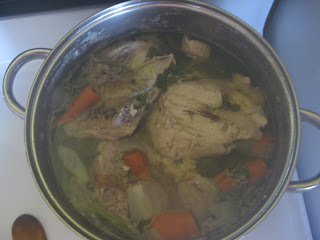The house smells like chicken stock. Onions. Peppercorns. I'm making a batch of chicken stock. It's one of the things I'd like to not purchase anymore. Along with bread and canned refried beans. Sure opening a can is easy, but really so is saving chicken bones and old vegetables and then throwing them in a pot with some water and whatever else you've got around... And the smell, well, it's very comforting.
For years now I've been interested in living a life less store-bought. I want to know what's in my food. I want to know there are no pesticides, growth hormones, plastics, or industrial waste in the things I eat. I want to know the animals I eat were raised naturally and slaughtered humanely. Also, ideally, I'd like to not purchase things from large, multi-national corporations whose #1 motive is profit. Sure, this is a bit of a pipe dream, and some have said it's unrealistic. But I'd like to give it a go. This nation was founded by folks who wanted to live independently. I am sometimes disheartened to see people trade their independence for the ease corporations provide. I realize that I'm simplifying things. And that not everyone can afford the time it takes to make their own bread or chicken stock, or raise their own food. But I now have the opportunity to do so, and I don't want to squander it.
So I am making chicken stock today. And my breakfast was toast from bread I made earlier this week (with store-bought peanut butter and homemade apple butter). The thing that's been on my mind a lot this week has been seeds. Three seed catalogs arrived in the mail this week. One, in particular, I am very excited about: The 2011 Ethnobotanical Catalog of Seeds, from J.L. Hudson, Seedsman. I'd read about this seed bank in Michael Pollan's book, Second Nature. This year marks the 100th anniversary of this public access seed bank. Their goal is to save species that might otherwise be lost in hybridization or genetically modified organisms. And although I know I won't be ordering all my seeds from them, it is exactly the kind of company I like: they don't deal in credit cards, they're independent and a little radical in their refusal to conform.
I finished another Michael Pollan book this morning: The Botany of Desire. According to Pollan, just as we are domesticating plants, so they are using us for their own purposes: the plants whose traits we like will be reproduced. It is a fascinating look at something I've never really thought about before. The last chapter is about potatoes. He grows potatoes from seed engineered by the Monsanto corporation to grow their own pesticide. The pesticide they grow is one found naturally in soil; and in the plants, called NewLeafs, the pesticide is present in every part: leaf, flower and root. To me, that is just disturbing. (I am not alone in that fear. In 2001, McDonald's, who was a major purchaser of NewLeaf potatoes, ended their contract with Monsanto out of consumer concern.) In the book, Pollan visits two different potato farmers. One is a farmer who raises thousands of acres of Russett Burbanks (the only potato McDonald's uses for its french fries) traditionally: with lots and lots of chemicals and pesticides. He tells Michael Pollan that he grows his own, organic, potatoes for eating, and that the ones he sells are too poisonous to eat directly out of the ground. The other farmer he visits is an organic potato farmer. He doesn't raise only one type of potatoes, but instead several varieties along with other vegetables. And although his farm takes much more manual labor to produce the same amount of potatoes, the farmer can eat the potatoes right out of the ground.
I am reading a lot about gardening and farming this winter. I know I have a lot to learn. I am sometimes blown away by concepts I'm shaky on: pH, F1 Hybrids, among others. Right now, this garden of mine is imaginary. I can imagine the plants growing, the flowers, the harvesting of the vegetables, the canning of vegetables on a hot summer day... Sometimes I imagine the bluejays eating my seeds out of the ground, or the deer eating the new shoots before I'm up in the morning, or slugs and beetles destroying what I've grown... I know that this garden is going to be an experiment and a challenge. And I can't wait.
Right now, though, I will continue to peruse these seed catalogs, and start figuring out what I will grow this year, and soon place those orders. And then the real work will begin!

No comments:
Post a Comment